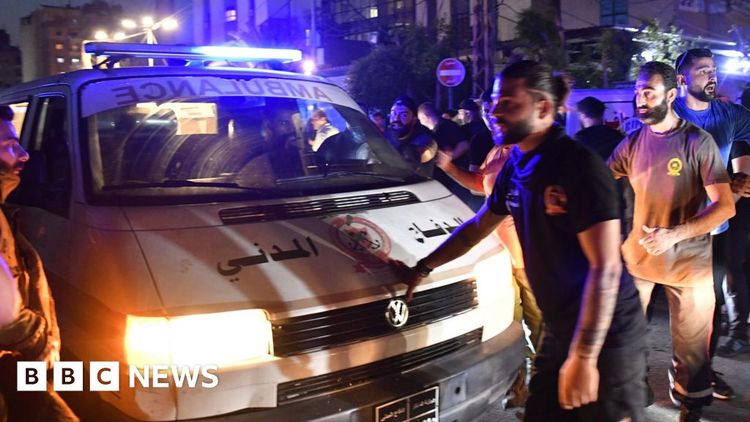Israel claims it killed senior Hezbollah commander in strike on Beirut

Israel claims to have taken out a high-ranking Hezbollah leader during an attack on a neighborhood in southern Beirut, Lebanon.
One individual lost their life and multiple others were injured in the blast that occurred in Dahiyeh, a region where the Lebanese armed organization is prominent.
The Israeli military says that Fuad Shukr was the objective of an operation carried out by fighter jets based on intelligence.
Authorities claim that he was behind a missile strike on the Golan Heights, which is controlled by Israel, that resulted in the deaths of 12 individuals, primarily children. Hezbollah has rejected any connection to the incident.
Lebanon's Prime Minister Najib Mikati spoke out against what he called a clear and aggressive act by Israel.
He called it a "criminal act" as part of a "series of aggressive actions causing the deaths of innocent civilians in clear violation of international laws."
After the attack, the Israeli Defense Minister, Yoav Gallant, quickly posted on social media saying that Hezbollah had crossed a critical boundary.
It is uncertain if Fuad Shukr was fatally injured in the assault. According to sources in Beirut, the planned victim was not present at the location. Hezbollah has not issued any comments on the matter so far.
An official from Israel has told CBS News, which is a partner of the BBC in the United States, that Israel informed the US about its attack on Beirut.
It is said that Fuad Shukr is a top consultant to the leader of Hezbollah, Hassan Nasrallah, according to previous statements by the United States.
They have been giving out a reward of $5 million (equivalent to £3.9 million) for any details on him, claiming he was also heavily involved in the 1983 bombing of a US Marines barracks in Beirut, where 241 US military members lost their lives.
Haret Hreik, the neighborhood in Dahiyeh targeted by the airstrike, is packed with people and well defended. Surrounding Dahiyeh are checkpoints controlled by Hezbollah.
Talking after the Israeli attack, White House spokesperson Karine Jean-Pierre informed journalists that US President Joe Biden thought that a larger conflict between Israel and Hezbollah could be prevented.
"We don't want things to get worse, we don't want a full-scale war," she stated.
Earlier today, two Israeli officials who did not disclose their names informed Reuters news agency that Israel wanted to weaken Hezbollah but did not wish to involve Lebanon in a full-scale war.
The Israeli military mentioned that they didn't plan on giving Israelis any new advice about finding shelter, implying that they didn't expect Hezbollah to react promptly or strongly.
Both parties understand the consequences of a full-scale conflict, which could potentially result in Iran providing backing to its Lebanese ally.
Many people were anticipating a response from Israel following the violent incident in the Golan Heights. The security cabinet granted Mr. Netanyahu and Mr. Gallant the authority to determine the appropriate course of action in retaliation.
At least 12 individuals lost their lives, with the majority being children, after a rocket struck a soccer field in Majdal Shams over the weekend.
Israel accused Hezbollah, but the group has denied any responsibility.
This was the most tragic event near the Israel-Lebanon border since tensions between Israel and Hezbollah intensified in October.
The increase in tensions followed Hamas' assault on Israel on October 7th.
Hezbollah, who backs Hamas, started a small battle in the northern part of Israel. Both groups have been shooting at each other since then.
In the past few days, global leaders have been calling for caution to prevent a full-scale war.
Earlier this week, the UK's foreign secretary advised British citizens in Lebanon to evacuate promptly to avoid being stuck in a conflict area.
David Lammy and Defence Secretary John Healey have traveled to Qatar to help stop the fighting in Gaza and to urge calm in the area, according to a statement from the Foreign Office.
He mentioned that increasing tensions and unrest were not beneficial for anyone, stating: "It is extremely important that we work closely with countries such as Qatar, who are important in negotiating peace in Gaza, to stop this destructive war."

















































